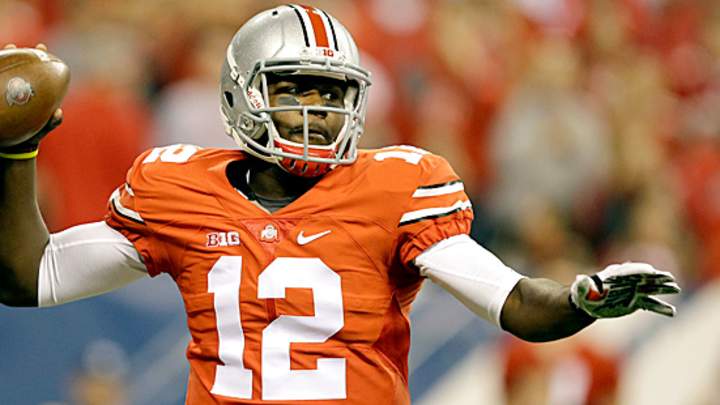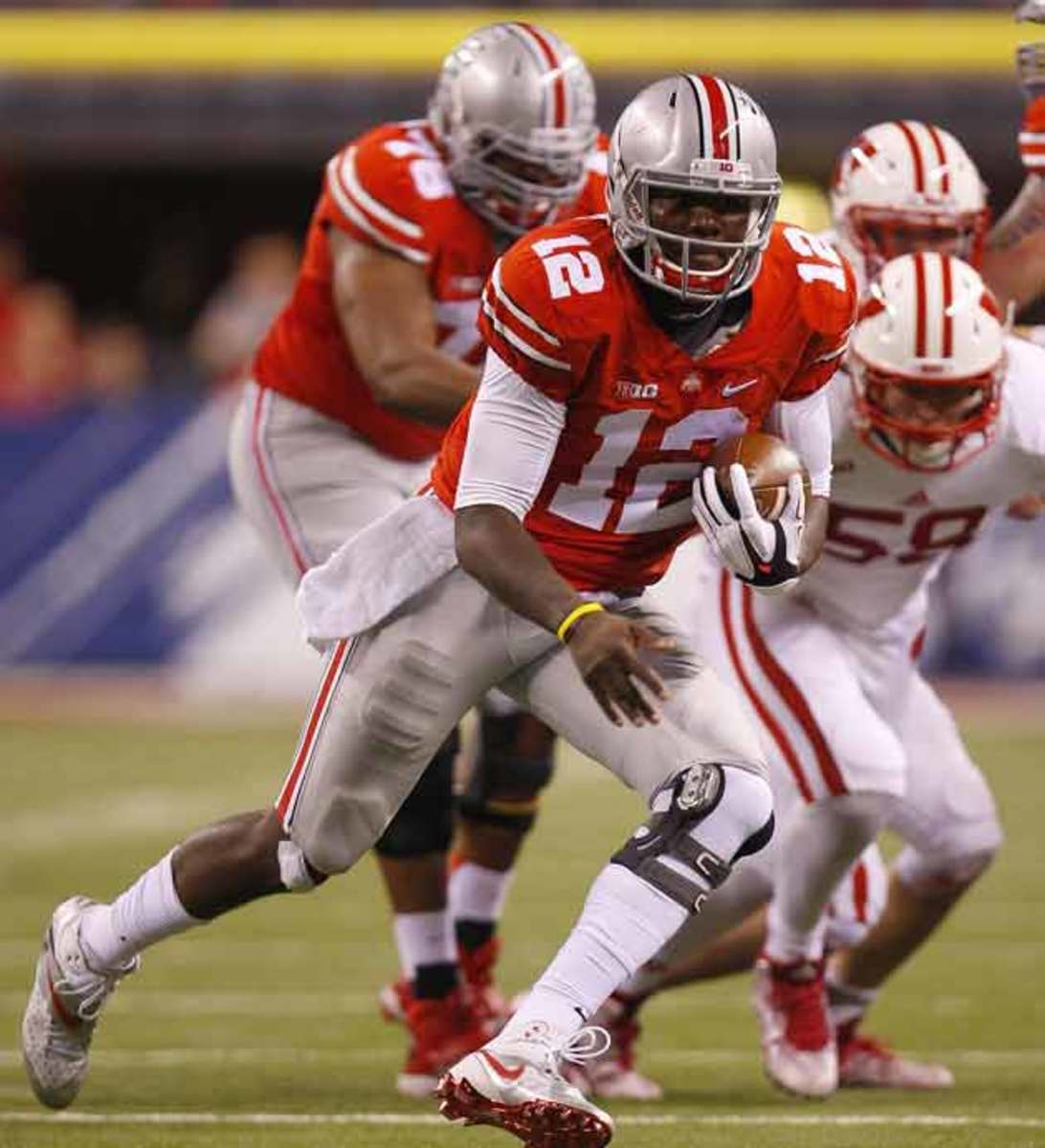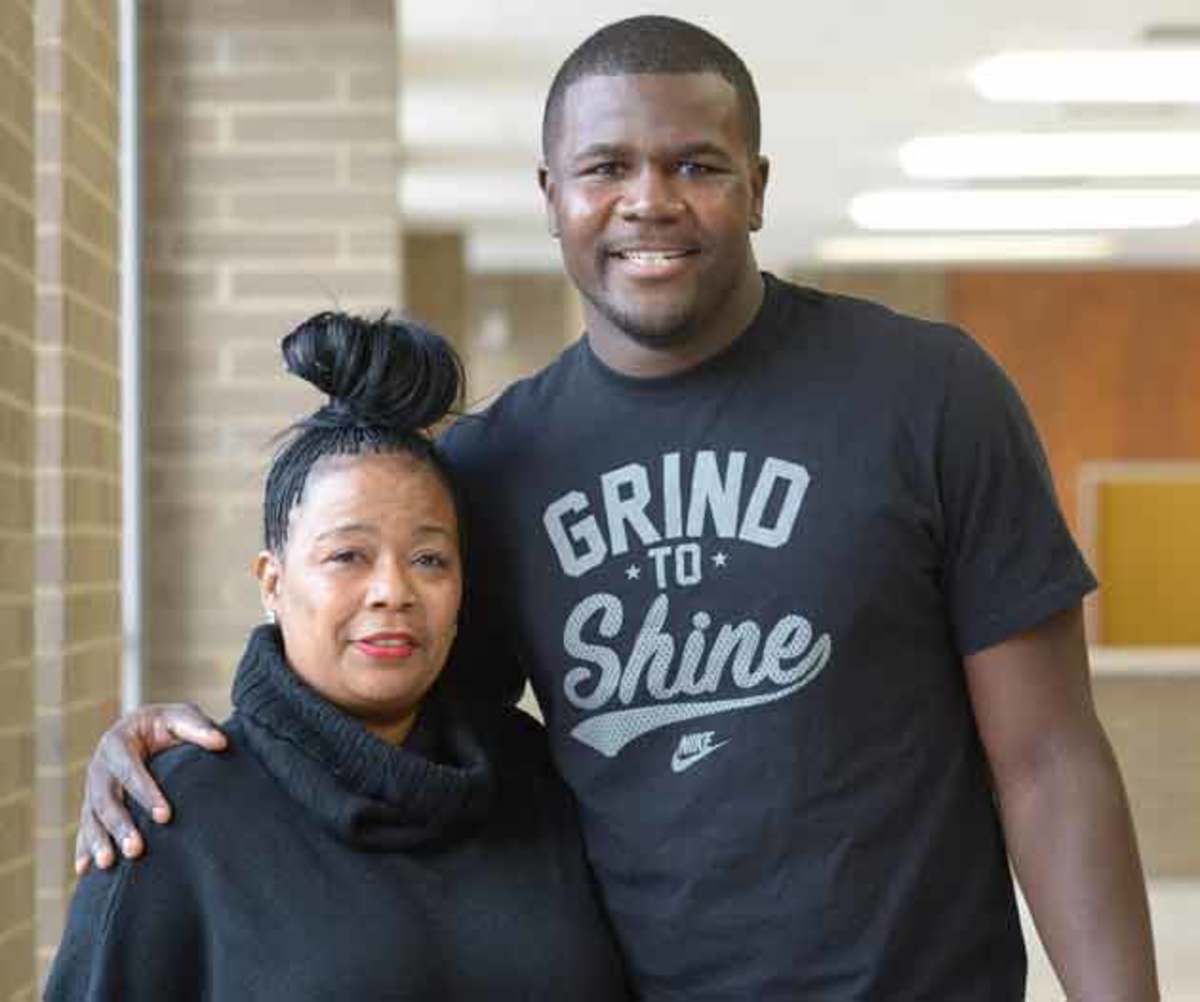Ohio State finds itself in good hands behind ebullient QB Cardale Jones

This story appears in the Dec. 29, 2014, issue of Sports Illustrated. Subscribe to the magazine here.
Two days after the game of his life Cardale Jones stood in front of an assembly at Ginn Academy, the Cleveland high school for boys that he attended. He looked into the gym and saw the students clad in dark slacks, half-tucked white shirts and awkwardly knotted ties. He didn’t know them, but he knew their empty stomachs and broken families. He knew their insecurity, their longing for conformity, the daily temptation of the drug trade. He also knew that even with his sudden stature as the quarterback who had led Ohio State to the Big Ten title with a 59-0 victory over Wisconsin in his first career start, they weren’t going to listen to his story. He wouldn’t have when he sat in those red bleachers.
“I’m not going to stand here and preach to you to death,” Jones said when he finally took the floor, “but listen to these good people around you, because they don’t want anything for y’all but to be successful.”
• SI STAFF: Predictions for the playoff games and every bowl
Jones, 22, knows the score and is not afraid to tell it, which might make him the most honest man in college football. Before his big game against the Badgers on Dec. 6, Jones was best known for a 2012 tweet about OSU’s academics that zinged college football’s contradictions: “Why should we have to go to class if we came here to play FOOTBALL, we ain’t come to play SCHOOL.” As he lingered at Ginn after his talk, he summarized the tortured nature of his relationship with former Ohio State offensive coordinator (and new Houston coach) Tom Herman by relating a comment he made to the coach earlier this year: “Remember when I used to f------ hate you?” He punctuates the remark, as he does most things, with a halogen grin so wide and infectious that his youth coach nicknamed him Gary Coleman.
There’s a charm to Jones’s unvarnished wit, but it also raises a question: How did he go from those Ginn Academy bleachers to a starting role in the first College Football Playoff? To those at his old school the answer is obvious. “When you’ve been in against-all-odds situations your whole life,” says Ted Ginn Sr., the school’s founder, “it becomes normal.”
*****
During Cardale’s freshman year at Ginn Academy he was thrown out of a class and exited with two middle fingers extended over his head, a move that earned him a visit to the office of the school’s namesake and executive director. The academy had opened in 2007 after Ginn proposed to the Cleveland Metropolitan School District that it set up a special facility for boys who needed or wanted an alternative approach. Ginn Academy, a public school that’s funded by the district, tries to develop its students both in class and out. Among its faculty of 55, the school has an 18-member youth support staff that’s on call 24 hours a day to provide advisement and that monitors attendance, academics and social behavior while providing a link between home and school.
Students at the academy are eligible to play sports at other schools, including nearby Glenville High, where Ginn is the football coach. Over 18 years he has accumulated a 178-41 record and sent more than 20 players to Ohio State, including his son, Ted Ginn Jr. (now with the Cardinals); Donte Whitner (Browns); and the 2006 Heisman Trophy winner, Troy Smith. Even more than as a coach, though, Ginn, a former security guard who has never taken a college class, has earned a reputation as a miracle worker for his innovative mentoring of troubled kids. He knows the names and home situations of all of the academy’s 350 students.
Cardale’s situation included growing up as the youngest of six kids in a family that bounced from house to house in the Glenville section of Cleveland. Cardale says he never met his father. (“I don’t know who he is. Period.”) His mother, Flo Jones, worked as a home-health aide and says she also braided hair and cleaned homes to bring in extra cash. With his mother working so much, Cardale was often on his own, sleeping at friends’ houses. He says he rarely got what he wanted -- sometimes he’d take off his shoes in class because they were too small -- but the family always had enough to get by.
Along the way, Cardale starred in basketball and football, starting his gridiron career wearing number 99 and playing left tackle and defensive line. Ginn saw Cardale play when he was eight and knew he would be a quarterback. Cardale went to the academy to work with Ginn both academically and athletically. The coach understood the complexity of Cardale’s background and what caused outbursts like the two-finger salute. One of Ginn’s sayings is that his kids shouldn’t be labeled “at risk,” as the only risk is that they won’t reach their potential.
“You can’t see where you’re going if you’re dealing with what you’re going through,” Ginn says. “That was Cardale.”
*****

The first time Michelle Nash ducked away to avoid crying in front of Cardale Jones was on the day they met, in fall 2008. Ginn had realized that the then 15-year-old Cardale needed one-on-one attention. Nash had run a day-care facility, Little Blessings, for 12 years before moving to the Cuyahoga County Juvenile Court Corrections Office, where she works with 18- to 21-year-olds who’ve committed violent crimes. She had been recommended by a parent of one of Ginn’s former players, Rams defensive back Christian Bryant.
Cardale and Nash got together after practice one day, and as they went to get something to eat, Nash couldn’t get over the sight of Cardale’s giant feet spilling over the ends of his flip-flops and hitting the pavement. After stopping at Subway, she took him, against her better judgment, to Foot Locker. “I know you shouldn’t do this when you first start mentoring,” she says, “but I couldn’t let him walk around like that.”
She let Jones pick out what he wanted, and he chose one of the least expensive options: a $69.99 pair of simple white Nike hightops. When the attendant asked his shoe size, Cardale told him 10. The guy laughed skeptically and measured Cardale’s feet: 12. Cardale turned to Nash and flashed that smile; he couldn’t remember the last time he got a new pair of shoes. That was it for Nash. She bolted from the store just before she began sobbing. “I’m a little emotional,” she says, “but it hurt my heart so bad.”
She continued to build a relationship with Cardale and even bought him a cellphone so they could stay in touch. (“He acted like I’d given him a million dollars,” she says.) About a month after they met he called her at 2 a.m., saying, “Ms. Michelle, will you come get me? I don’t want to live like this no more.”
Thinking Cardale’s stay would be temporary, Nash bought an air mattress and, she says, spent the next few weeks leaving messages with Cardale’s mom without hearing anything back. (Flo Jones, 52, denies this and says she walked around “plenty of nights” looking for Cardale. There is considerable tension between her and Nash, 47.) Eventually Nash purchased a bedroom set for Cardale and decorated his room with football and basketball paraphernalia. The night she unveiled it, he told her that he’d never had a bedroom of his own. Nash, who had found out at 17 that ovarian cysts would prevent her from having kids, walked out of the room and bawled her eyes out.
Cardale soon found that the perks of having a bedroom, cellphone and new shoes came with a curfew, mandatory homework and earlier bedtimes. “Michelle gave me a different structure because when I lived with her, she could take things away,” he says. Flo says she did her best to provide for her kids and says she’s “grateful” for what Nash did. “He needed to be somewhere he could be focused.”
Cardale struggled, though. Friends teased him about his new guardian: “Is that, like, your Sugar Mama?” He would eventually give Nash a nickname, Crybaby, and even start calling her Mom, but at the time he didn’t know how to introduce her. He became self-conscious that they looked nothing alike -- he’s 6'5", 245 pounds, and she’s 5'1" and petite. He felt as though everyone knew she couldn’t be his mother. The awkwardness was illuminated on Senior Day at Glenville, when fourth-year players traditionally walk onto the field with their parents. Cardale was the star of the team, but when Flo showed up, he hid in the locker room and didn’t participate in the ceremony. Flo says she was told he didn’t fill out the paperwork for her to walk out with him. “That was the worst thing in my life he’d done to me,” she says “He hurt me. You know how I felt when I had to leave the football field?”
Cardale later apologized, and he maintains a relationship with his mother. But he does point out that she has never visited his dorm room or his apartment at Ohio State. She did attend the Big Ten title game. “My mom started really coming around when I was successful at football,” he says, “and I’m not a dumb-ass kid.”
*****

Tom Herman met Cardale Jones at Fork Union Military Academy in rural Virginia, and the meeting was a harbinger of the disconnect that would plague them for the next two years. Jones, who had offers from LSU, Michigan and Iowa, wanted only to be a Buckeye -- so much so that he voluntarily spent a semester at Fork Union and then redshirted to create separation between himself and Braxton Miller, a higher-rated quarterback in the same high school class who’d also committed to OSU.
At Fork Union, Jones kept a cellphone, which was against school rules. (He hid it in a pants cuff during the day and behind books at night.) When Herman asked for Jones’s number, Jones grew suspicious. Didn’t the coach know Jones wasn’t supposed to have a phone? He declined to give it out: “He might be a f------ spy,” he recalls thinking, face parting in that jack-o’-lantern grin. “I ain’t telling your ass.”
The distrust cut both ways. Soon after Jones enrolled at Ohio State, Herman and the other coaches began to doubt his ability to make it as a Buckeye. He was out of shape, not interested in hard work and academically indifferent. Sophomore safety Tyvis Powell, Jones’s roommate and closest friend on the team, says Jones was essentially addicted to video games, especially but not exclusively Call of Duty.
A typical exchange between the two:
Powell: Aren’t you going to class?
Jones (controller in hand): Not today.
Jones’s absences, late arrivals for workouts and blown-off tutoring sessions put him at odds with Herman. He had constant meetings with Herman and coach Urban Meyer in which Jones spoke his mind. “I’d be like, ‘Did you really say that to them?’” Powell says. “But Cardale isn’t going to hold back.”
Things bottomed out when Herman put a dunce cap on Jones in a quarterbacks meeting last year. The cap wasn’t indicative of Jones’s intelligence -- “He’s really smart and quick-witted,” Herman says -- but rather a sign of frustration at Jones’s refusal to accept his responsibilities. Finally Herman drew up a contract stating that if Jones missed class and didn’t achieve a certain grade-point average, he’d be kicked off the team. “There were continual doubts in my mind whether he would make it or not,” Herman says.
Spring 2014 marked a turning point. Miller sat out spring practice with a shoulder injury, and Jones worked with the first unit as the starter, over J.T. Barrett. “You can see why he’s at Ohio State,” Herman says. “He’s got an elite talent level.” As the spring progressed, Jones’s maturity began to catch up to his ability. Weeks went by without a lecture from Herman about missed classes or tardiness. “He realized he needed to mature,” Powell says. “He’s the same silly person, but he’s a bit more censored.”
Jones’s battle with Barrett for the backup spot took on new weight when Miller, the two-time Big Ten offensive player of the year, reinjured his right shoulder on Aug. 19 and was declared out for the season. The coaches felt Barrett had been better over the previous 10 days, so he became the starter. But it was a close call.
Jones never became a distraction, even after Barrett struggled early. He threw three interceptions and went 9 for 29 in Ohio State’s lone loss, to Virginia Tech on Sept. 6 (35-21). From there Barrett delivered consistently stunning performances, and he would finish with 34 touchdown tosses while completing 64.7% of his passes. A few weeks into the season, Jones saw Barrett’s progress and had a sit-down with Herman about his future. Jones never lobbied to start, but he said in his typical style, “Dude, come on, let’s do the math here. J.T. is younger than me, he’s the future right there, and you got Braxton coming back. You want me to stick around and be the third quarterback forever?”
A transfer seemed likely until Barrett fractured his right ankle in a 42-28 win against Michigan on Nov. 29. Jones played error-free in less than a quarter of mop-up duty, but he admitted afterward that he wasn’t in game shape. Heading into the Big Ten championship game he did extra sprints, got in extra throwing to hone his timing and watched extra film, even coming in on Sunday and Monday, usual off days. Powell says Jones hardly played video games all week.
As the Wisconsin matchup approached, Jones watched ESPN and read his Twitter mentions, in which the notion was flourishing that Ohio State needed to dumb down the playbook for him. “I took that personal,” he says. It showed as he lofted three touchdowns to Devin Smith -- over-the-top lobs of 39, 44 and 42 yards -- and guided a turnover-free performance by the Buckeyes. On the field after the game Herman kissed Jones. “No matter the place on the depth chart or pecking order, at some point there’s a good chance your number is going to be called,” Herman says. “I’m really, really proud of him.”
*****
On the morning of Nov. 7, Jones’s longtime girlfriend, Ohio State nursing student Jeaney Durand, went into labor in Cleveland a month before her due date. Nash called and called Jones. Cardale finally got the news around 5:30 a.m. He immediately drove the 140 miles from Columbus, showing up at the hospital less than five minutes before his daughter was born, squeezing Jeaney’s hand while she pushed.
Little Chloe Jones entered the world around 8 a.m. Her father drove back to Columbus that day for class and practice but insisted he FaceTime with Chloe all day. He told Nash, “She’s going to have a father, she’s not ever going to know what it is for me not to be around.”
As Nash recounted this, the tears began to flow again, and she choked up when she shared Chloe’s middle name: Michelle. As she finished the story, a familiar voice boomed from across the room: “Crybaby is crying again.” Then Cardale Jones smiled that big Cardale smile.
